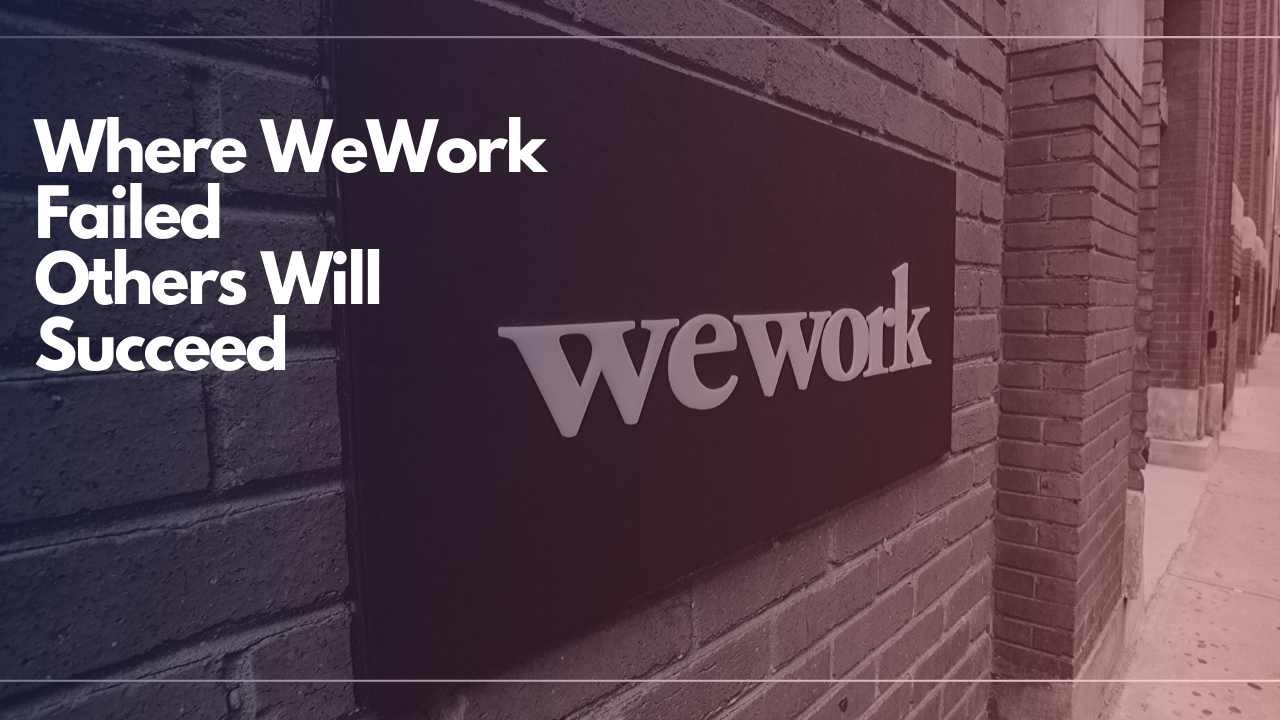- Adam Neumann had big aspirations for WeWork, yet he failed to realize them.
- Where WeWork (and Neumann) failed, others will succeed.
- Though the giant of coworking has fallen, the industry will continue to thrive and prosper.
This article was written by Marnie Vinall, Publicist and Copywriter at 3 PHASE MARKETING
WeWork promised big things: a revolutionised way to do business by tapping into the entrepreneur spirit of millennials and offering a community that boosted one’s success as a ‘we’.
The business, under We Company, started as just one office space in New York City and then rapidly grew to having 800 locations open across 124 cities globally with the help of finance from investors, most notably SoftBank. The We Company also grew to include a WeWork Labs, WeLive, WeGrow and Rise by We.
But things started to rapidly crumble when co-founder and ex-Chairman, Adam Neumann, publicly filed for an IPO in August with a $47 billion valuation. The filing shed a bright light on WeWork’s financials, including its $1.6 billion loss in revenue in 2018, and plenty of other questionable business decisions.
Shortly after the company’s S-1 was filed, Neumann stepped down as CEO and Chairman; new company executives began selling of side businesses and thousands of WeWork employees were laid off; and the New York Attorney General’s Office and the SEC began an investigation on WeWork and Neumann.
Neumann had big aspirations for WeWork — including having it become the first trillion dollar company. What he had in vision and charisma, he lacked in business savviness and know-how.
As reported by Vice, Ian Lee, Associate Professor at Carleton University’s Sprott School of Business commented, “it’s not unusual for entrepreneurs and visionaries to have a big ego, but it’s got to be backed up by a good business model that is ultimately going to create value and make money. WeWork didn’t have that.”
But where WeWork failed, others can succeed. Coworking can be a profitable business, it just needs to be executed correctly.
Since conception, WeWork had been the face of coworking. Whenever movies, tv shows or comedy sketches needed a shared office space to depict something or someone, it was always in a WeWork. It’s fair then that a lot of people saw WeWork’s downfall as the downfall of shared offices spaces.
But this isn’t the case.
Even if the ‘we’ concept under an ambitious and misguided Neumann failed, the concept of coworking will only continue to thrive and prosper.
As David Seinker, CEO and founder of South African coworking company, The Business Exchange (TBE) stated, “WeWork is a case all on its own. Coworking is by no means a flash-in-the-pan phenomenon and it certainly doesn’t end with WeWork. In fact, the business model has been around very successfully for at least 30 years.”
Shared workspaces have become an industry in themselves. Allwork.Space reported that as of May this year there are approximately 35,000 flexible workspaces worldwide with a global market value of approximately $26 billion.
Furthermore, in 2019 flexible workspaces accounted for more than two-thirds of the U.S office market occupancy gains, and by 2030 they are expected to represent 30% of U.S office stock.
The numbers for shared workspaces are also notably and steadily increasing in capital cities with new hubs popping up left, right, and centre. And they are becoming progressively more niche and tailored to particular needs and markets. Right now, three Sydney women are fundraising to create a coworking space, Frankly Co, created especially for women with childcare and fitness options on site.
When WeWork started to see its downfall, shared office spaces across the globe were quick to point out what makes them different. Most flexible workspaces focus on the same community aspect that made WeWork thrive but they do so in a way that helps small businesses prosper rather than simply offering social interaction over free-flowing kombucha.
For the Australian shared workspace, Waterman Business Centres in the Eastern suburbs of Melbourne, community is a main selling point. Chris Jbeily, Marketing Manager of Waterman Business Centres commented that “starting a business is a tough gig, and one of the hardest parts is doing it alone. That’s what we think is one of the main benefits of being at a shared workspace like ours. It’s not just a nice desk or cool couches, but a real community of thousands of like-minded people who come together to build something great.”
The demand for people to have somewhere to work on their own time that’s not a café or couch is only going to increase. Even corporate companies are embracing the shared workspaces and moving their teams into large coworking centres. Despite WeWork’s crumble, small businesses, freelancers and corporate entities will still continue to coexist and work side by side thanks to this growing industry.
Neumann spent money flippantly and took uncalculated risks, but that doesn’t mean everyone else in the coworking game isn’t grounded in business strategy and planning. If other shared workspace operators have an effective business model that caters to the current needs and demands of workers, there’s no reason they should follow in WeWork’s falling footsteps.
WeWork couldn’t hack the shared workspace under ex-CEO and chairman Neumann, but that doesn’t mean the end of coworking. As the expectations of how and where people work continue to shift, coworking spaces are only going to keep growing in popularity.



 Dr. Gleb Tsipursky – The Office Whisperer
Dr. Gleb Tsipursky – The Office Whisperer Nirit Cohen – WorkFutures
Nirit Cohen – WorkFutures Angela Howard – Culture Expert
Angela Howard – Culture Expert Drew Jones – Design & Innovation
Drew Jones – Design & Innovation Jonathan Price – CRE & Flex Expert
Jonathan Price – CRE & Flex Expert












